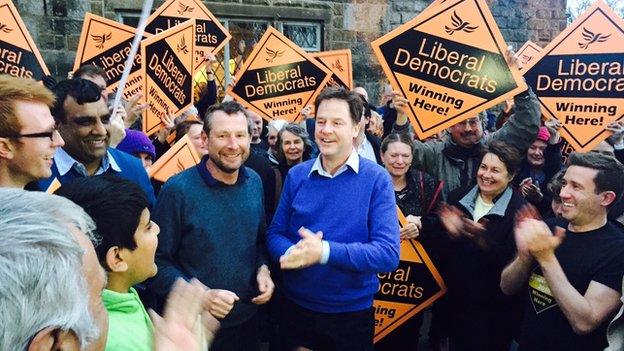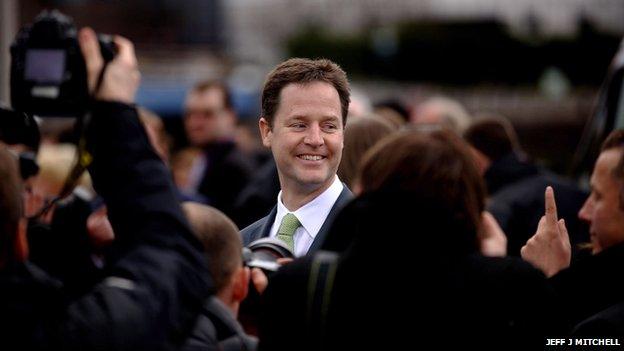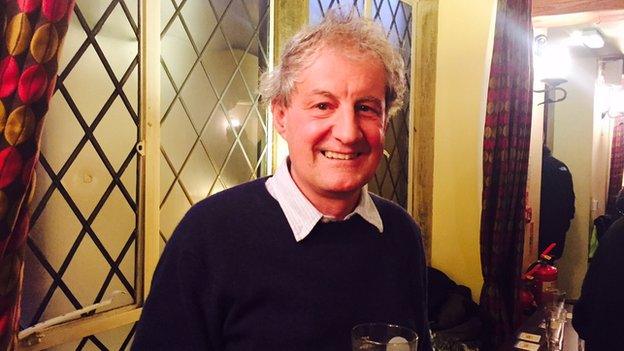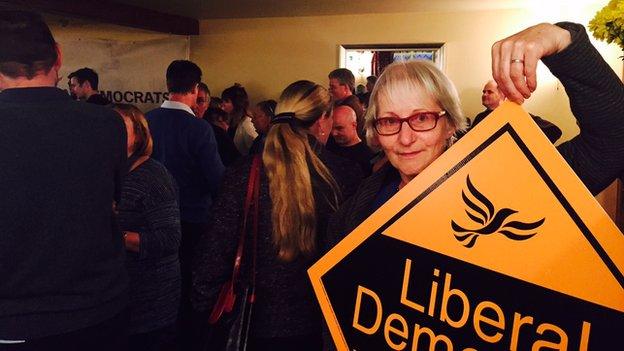Nick Clegg tries to fight past alliances with future predictions
- Published
- comments

Liberal Democrat leader Nick Clegg greets supporters in his home constituency of Sheffield Hallam
Liberal Democrat leader Nick Clegg bounds into the centre of the crowd at the Norfolk Arms Hotel, located in the hills on the edge of town in the Sheffield Hallam constituency.
"We're in a pub, so I've got a pub quiz for you," he shouts. "Unemployment in Sheffield Hallam is half of what it was compared to five years ago. Was it A, the Labour Party, or B, the Liberal Democrats who did that?"
He follows that up with another question, about which party has ensured that more than a billion pounds has been spent repairing Sheffield roads and streetlights over the past few years.
"The Liberal Democrats!" the crowd of volunteers and supporters shouts with glee.
There's a famous saying by former US Speaker of the House Tip O'Neill that all politics is local - and that certainly was the case on Tuesday night.
Mr Clegg is in the middle of a marathon bus tour of closely contested races across the UK, but Sheffield Hallam is his home constituency, which he has represented in Parliament for 10 years. And recent polls suggest that he could be fighting for his political life here, as his Labour opponent, Oliver Coppard, is presenting a strong challenge.
Liberal Democrats appear to be in trouble across the country, after posting a record number of wins in 2010. The party currently holds 56 seats, and political forecasters say that if they keep half of them after Thursday's election, they should consider it a moral victory.

Nick Clegg campaigning in Glasgow in the lead-up to the 2010 General Election, which saw them gain a large number of seats
The problem for the Liberal Democrats stems in part from their decision to join in a governing coalition with the Conservative Party five years ago. The move installed Mr Clegg as deputy prime minister, but it also tied his party to the austerity budget cuts the government imposed in response to the recession of 2008.
Mr Clegg had to go back on a promise not to raise tuition fees, for instance, presenting a challenge for a party largely comprised of moderate voters on the left and the right.
Even Mr Clegg's supporters admit the coalition with the Conservatives has been difficult for their party.
"Labour was soundly defeated last time, they were being rejected," says Sheffield resident Christopher Pennell, a former Labour voter who left the party over the Iraq War. "The Liberal Democrats couldn't, as it were, strap themselves to a corpse. A sensible negotiation with conservatives was the right thing to do as a nation, and we've paid as a party for it. Inevitably people would feel betrayed. But we've done a brave thing for everybody."

Christopher Pennell, a Lib Dem supporter at the Norfolk Arms, thinks the party's coalition with the Conservatives was damaging but necessary
Now Mr Clegg is changing the way he pitches his party to the people. He's framing himself as the only candidate who can talk honestly about the likely outcome of the election - a fractured Parliament where no party has a clear governing majority and coalitions and deal-making will be necessary to secure 10 Downing Street.
"Ed Miliband and David Cameron, they don't want to create stability," Mr Clegg says. "They want to create a shambles." He says that the Conservatives will be beholden to their right wing and the UK Independence Party, while Labour will answer to Scottish National Party politicians who want to break up the United Kingdom.
The Liberal Democrats were a moderating influence on the Conservatives over the last five years, he contends, and going forward they can serve as a bulwark in challenging political times.
"Only the Liberal Democrats can provide stability, only the Liberal Democrats will guarantee decency in government, only the Liberal Democrats will act for the whole of the country," he says. "So if you want a stable, decent, united United Kingdom, you've got to vote for it."
It's the kind of pitch to clear-eyed responsibility that many of Mr Clegg's supporters in the room said attracted them to the Liberal Democrats in the first place.

Barbara Masters from Sheffield Hallam likes the Lib Dem call for responsible action over the economic recession
"If you want your personal freedoms, you've also got to take responsibility for actions and try to do something positive," says Barbara Masters, another Sheffield Hallam constituent. "You can't expect someone to constantly bail you out of things by just throwing cash at you. That's not the way."
On Thursday the verdict will be in on whether Mr Clegg's new strategy to cast the Liberal Democrats as the grown-ups in the room pays dividends.
In the meantime recent stories indicate that Mr Clegg, the local MP who gets roads paved and finds people jobs, may be getting help in his race from an unlikely source, external - Conservatives who are opting to vote for him over their candidate, Ian Walker, in order to keep Labour from winning the seat.
It's an illustration of the complicated political calculus voters are facing in this most unusual, hotly contested election.